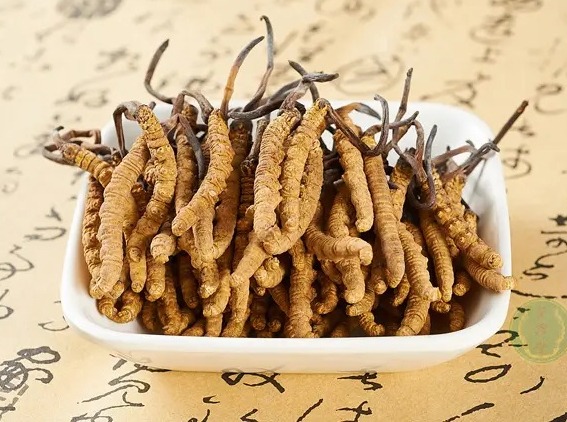General Details
Product name: Fermented Cordyceps Powder(Mycelium powder of Paecilomyces hepiali).
Plant latin name: Cordyceps sinensis.
Active ingredients: Polysaccharide≥4.0%, adenosine≥180mg/100g, mannitol≥8.0%, protein≥8.0%.
Appearance: Ligh brown to brown.
Odor: Almost odorless.
Fermented cordyceps powder is the dry powder of the mycelium obtained by separating and purifying the fresh paecilomyces hepiali from fresh cordyceps sinensis, obtained by fermentation at low temperature. This product is light brown to brown in powder form and can be used as a raw material for healthy food.
As an antioxidant cordyceps powder(mycelium powder of paecilomyces hepiali) can improve the body’s immunity. It has auxiliary therapeutic effects on chronic nephritis, bronchitis, asthma, chronic hepatitis, tumor, and chemotherapy.
Health Benefits
Boost Immunity
Cordyceps polysaccharides can promote non-specific immunity, increase the spleen’s weight, and enhance the reticuloendothelial system’s function. Cordyceps can accelerate the clearance of colloidal carbon particles in the blood and improve the phagocytic ability of peritoneal macrophages.
Cordyceps polysaccharide can increase the number of T helper cells in peripheral blood and spleen cells but does not affect the number of T suppressor cells. Cordyceps polypeptide has a mild stimulating effect on the proliferation of thymus and spleen cells within a specific concentration range and directly stimulates the proliferation of T helper cells; it does not affect the production of I-2 by spleen cells but can induce the expression of L-2. receptor.
Cordyceps polysaccharides can increase the activity of natural killer cells in the blood and can partially antagonize the inhibitory effect of cyclophosphamide on this cell. Cordyceps polysaccharides can promote cellular immunity and inhibit humoral immunity. Cordyceps polysaccharide can also promote the phagocytosis of the reticuloendothelial system and peritoneal macrophages.
Antitumor
Cordyceps polysaccharide has an antitumor effect. It has a strong inhibitory effect on ascites tumor and has a specific inhibitory effect on lung cancer, with an inhibition rate of 30% to 50%; it is effective on various experimental transplanted tumors such as sarcoma S3, sarcoma S1, leukemia P3, and breast cancer MA3. Cordyceps polysaccharide can inhibit carcinogen-induced hyperplasia and carcinogenesis of the gastric epithelium. It can inhibit human cervical cancer cells cultured in vitro and the growth and colony formation of laryngeal cancer cells.
The anti-cancer effect of Cordyceps polysaccharide is mainly achieved by improving the body’s immunity, promoting the transformation rate of spleen lymphocytes, activating the phagocytic activity of peritoneal macrophages, and significantly improving the body’s non-specific immunity. Clinical experiments have shown that Cordyceps polysaccharides have significant effects on patients with advanced cancers, including lung cancer, liver cancer, and prostate cancer.
Relieving Asthma, Eliminating Phlegm and Anti-inflammation
Cordyceps polysaccharide has a strong inhibitory effect on pathogenic bacteria such as Streptococcus, Mycobacterium tuberculosis, and Streptococcus pneumonia. Cordyceps polysaccharide has a good impact on the prevention and treatment of emphysema. Cordyceps polysaccharide has a good preventive effect on emphysema. The lung tissue basically maintains the original structure, the number of alveoli is slightly reduced from that of normal tissue, and the structure of the lung tissue is clear. In addition, Cordyceps polysaccharide has certain antitussive, antiasthmatic and expectorant effects.
Cordyceps polysaccharide has an obvious anti-inflammatory effect on auricular inflammation, foot swelling, and cotton ball granuloma. Its mechanism of action may be related to the ability of Cordyceps polysaccharide to enhance the synthesis and secretion of adrenal cortex hormones. It increases adrenal weight and cholesterol levels in the glands and increases plasma cortisol and aldosterone concentrations.
Sedation
Cordyceps polysaccharide preparation has a sedative effect, and soon after injection, the animal’s activity is reduced. The eyes are closed like sleep, but it generally does not cause sleep, and it still responds to various external stimuli. This may be mainly due to the effect of adenosine in the polysaccharide of Cordyceps sinensis because adenosine has a significant inhibitory effect on the nervous system.
Protection of cardiovascular system
- Effects on the heart: Cordyceps polysaccharide can slow down the heart rate, significantly prolong the hypoxia tolerance, and increase the uptake of Rb by the myocardium, indicating that it can increase the nutritional blood flow of the myocardium. It has a certain therapeutic effect on myocardial infarction caused by stress in rats and can slow down the beating frequency of myocardial cells. Intraperitoneal injection of Cordyceps preparations can significantly reduce myocardial oxygen consumption.
Cordyceps is also effective on blood pressure, blood flow resistance, and blood flow of tissues and organs. Cordyceps polysaccharides can reduce blood pressure and increase the blood flow of the heart and brain tissue.
- Lowering blood lipid and anti-arteriosclerosis: Cordyceps polysaccharides can reduce total serum cholesterol (TC) and triglyceride (TG); reduce liver TG but do not affect liver tissue TC content. The primary mechanism is that Cordyceps sinensis can inhibit cholesterol synthesis in liver tissue but has little effect on the absorption and excretion of cholesterol.
Cordyceps sinensis can also reduce blood lipids in hyperlipidemia and arteriosclerosis models, reduce the degree of aortic atherosclerosis, and reduce cholesterol content in the aorta.
- Effects on platelet function and hematopoietic system: Cordyceps polysaccharide can inhibit the aggregation of isolated platelets induced by ADP and collagen. The effect on human platelets is several times stronger than that on rat platelets. The inhibitory effect on collagen-induced aggregation is much stronger than ADP-induced aggregation. Its mechanism of action may increase the content of cAMP in platelets.
